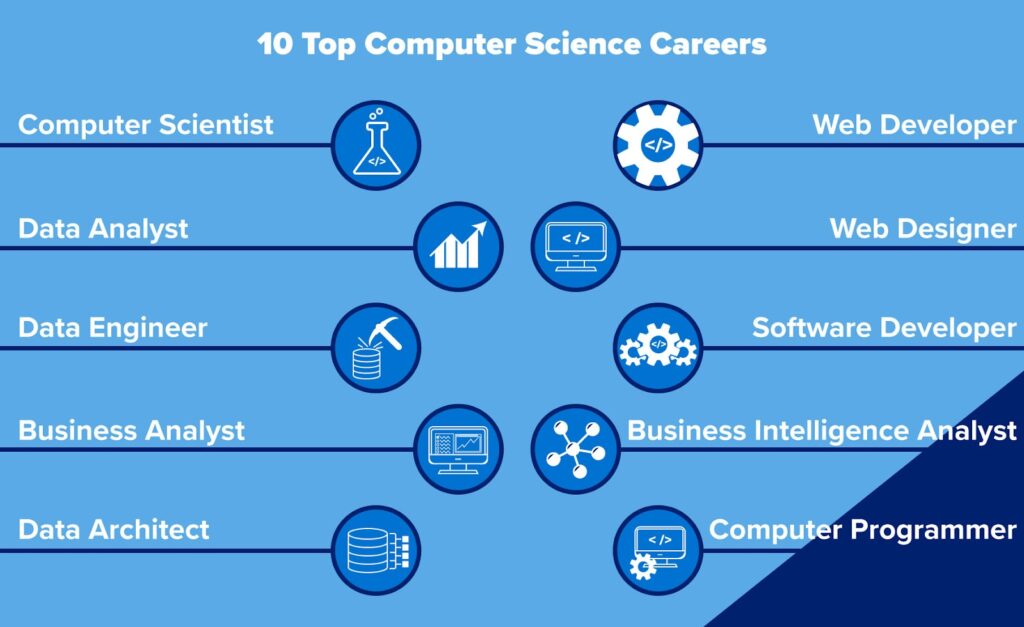A computer science degree opens doors to a variety of rewarding career paths. Graduates can become application analysts, developing and optimizing software applications. They might also venture into cybersecurity, safeguarding digital systems as analysts.
Others choose data analysis, interpreting data to drive business decisions. Gaming enthusiasts might find fulfillment as game designers or developers, crafting immersive experiences. Those with a knack for problem-solving might excel as software engineers, building innovative solutions.
Additionally, computer science graduates can explore roles in web development, UX design, or even teaching. With a solid foundation in coding, problem-solving, and teamwork, computer science majors are well-equipped for success in the dynamic tech industry and beyond.
Top Skills Computer Science Majors Bring to the Job Market

Computer science majors possess a diverse array of skills that extend beyond mere programming proficiency. These skills are highly sought after by employers across various industries:
Programming Proficiency
Computer science majors are well-versed in various programming languages, from foundational languages like Python to more specialized ones like C++. Their ability to code and problem-solve is essential for tackling complex technical challenges.
Problem-solving
A cornerstone of computer science, problem-solving is ingrained in every aspect of coding. Computer science majors excel at devising creative solutions, often drawing from resources like GitHub and Stack Overflow to overcome obstacles and optimize their code.
Teamwork
Collaboration is at the heart of every successful project in the realm of computer science. Computer science majors undergo extensive training in working collaboratively, often participating in group projects that simulate real-world scenarios. These experiences not only foster a spirit of cooperation but also hone interpersonal skills such as active listening, conflict resolution, and consensus-building.
Beyond just dividing tasks among team members, computer science majors learn to leverage the diverse skill sets and perspectives within their teams. They recognize the importance of synergy, where the collective efforts of the team yield results greater than the sum of individual contributions.
Furthermore, working in teams exposes computer science majors to agile methodologies and iterative development processes, preparing them for the dynamic and fast-paced environments they will encounter in their professional careers.
Project Management
Engaging in group projects equips computer science majors with invaluable project management skills. They learn to define project scopes, set milestones, and allocate resources efficiently, essential competencies for navigating professional roles and responsibilities.
Communication
Effective communication lies at the core of every successful collaboration in computer science. Computer science majors not only excel in writing efficient and well-documented code but also in articulating technical concepts to diverse audiences.
Through rigorous coursework and group projects, computer science majors refine their ability to convey complex ideas clearly and succinctly. They understand the importance of tailoring their communication style to suit the needs of different stakeholders, whether they are fellow programmers, project managers, or end-users.
In addition, computer science majors appreciate the significance of feedback in the iterative development process. They actively seek and provide constructive feedback, fostering a culture of continuous improvement and mutual respect within their professional environments.
What do most computer science grads pursue?
| Destination | Percentage |
| Employed | 75.7 |
| Further study | 5.4 |
| Working and studying | 7.5 |
| Unemployed | 6.6 |
| Other | 4.8 |
Here’s a breakdown of the types of work for employed computer science graduates:
| Type of Work | Percentage |
| IT | 76.4 |
| Retail, Catering, and Customer Service | 4.3 |
| Business, HR, and Finance | 4.1 |
| Clerical, Secretarial, and Administrative | 2.5 |
| Other | 12.7 |
High-Paying Computer Science Jobs

Here are some high-paying computer science jobs:
Software Engineer
Average salary: $88,568
Software engineers are the architects of the digital world, translating ideas into lines of code that power everything from user interfaces to data storage. While the term “software engineer” may seem straightforward, the role encompasses a diverse array of tasks and specializations. Front-end developers focus on the visual aspects of software, crafting interfaces that users interact with directly.
Meanwhile, back-end developers delve into the behind-the-scenes functionality, managing data storage and processing. Full-stack developers bridge the gap, blending front-end and back-end expertise to create holistic solutions.
If your passion lies in programming and problem-solving, software engineering could be your perfect fit. Armed with a strong foundation in computer science, you can dive into this dynamic field without the need for a graduate degree—though further education is always an option for those seeking to deepen their expertise.
AI and machine learning
Average Salary: machine learning engineers earn around $112,000 per year and data scientists make approximately $122,000 annually. AI researchers can expect even higher salaries, often exceeding $150,000 per year.
Artificial Intelligence (AI) and machine learning are driving forces behind the Fourth Industrial Revolution, transforming industries and shaping the future of technology. From smart homes to autonomous vehicles, AI is ubiquitous in our daily lives, revolutionizing how we interact with the world around us. If you possess a blend of creative thinking and analytical skills and aspire to contribute to global innovation, a career in AI and machine learning might be perfect for you.
Common job titles in this field include Machine Learning Engineer, Data Scientist, and AI Researcher. Typically, candidates are required to have a Bachelor’s or Master’s degree in Computer Science, along with proficiency in programming languages like Python, Java, and R. Salaries in this field are competitive.
QA/Test Engineer
Average salary: $71,658
In the world of software development, quality assurance (QA) engineers serve as the frontline defenders against bugs and glitches. Their mission? To ensure that software behaves as intended by meticulously testing its functionality.
Whether it’s through writing code for automated tests or manually probing for vulnerabilities, QA engineers are adept at identifying and resolving issues before they impact end-users. Detail-oriented and methodical, they approach testing as a puzzle to be solved, striving to uncover potential pitfalls and strengthen the integrity of the software.
If you possess a knack for dissecting systems and enjoy the challenge of unraveling complex problems, QA engineering might be your calling. With programming skills akin to software engineers, QA engineers play a critical role in safeguarding the reliability and performance of digital solutions.
UX Researcher
Average salary: $88,647
Enter the world of user experience (UX) research, where understanding the needs and preferences of users reigns supreme. UX researchers conduct in-depth studies to glean insights into how users interact with products, aiming to enhance usability and satisfaction.
Through a blend of experiments, interviews, and data analysis, they uncover valuable feedback that informs product improvements and innovations. While closely aligned with UX designers, UX researchers focus more on empirical investigations, delving into the psychology and behavior of users to shape intuitive and engaging experiences.
Communication prowess is paramount in this role, as UX researchers frequently engage with users and stakeholders to convey findings and drive decision-making.
A background in computer science provides a solid foundation for navigating technical aspects while pursuing advancements in product usability. While not mandatory, pursuing a graduate degree in related fields like human-computer interaction or communications can further enrich your expertise in UX research.
Product Manager
Average salary: $100,446
Product managers (PMs) are the orchestrators behind the scenes, guiding products from conception to fruition. Charged with navigating the intricate product lifecycle, PMs make pivotal decisions, align stakeholders, and ensure adherence to timelines. With a keen understanding of both technical intricacies and market dynamics, they bridge the gap between engineering teams and business objectives, steering products towards success.
While a technical background provides valuable insights, PMs also require strong management acumen to navigate multifaceted projects effectively. Entry-level roles like associate product manager (APM) offer a pathway for aspiring PMs to gain hands-on experience and hone their leadership skills early in their careers.
Data Scientist
Average salary: $97,294
Data scientists are the modern-day alchemists, turning vast troves of data into gold mines of insight. They’re the masterminds behind building systems that collect, store, analyze, and utilize data to provide invaluable business intelligence. Situated at the nexus of computer science, statistics, and mathematics, data scientists wield their expertise to inform crucial business decisions.
In today’s data-driven world, proficiency in coding, algorithms, and machine learning is often a prerequisite for data roles. While some companies used to hire fresh graduates, the landscape has evolved, with most data scientist positions now requiring advanced degrees. Particularly in roles delving into machine learning, a master’s degree or higher is often the key to unlocking these sought-after opportunities.
Web Developer
Average salary: $60,668
Web developers are the architects of the digital world, crafting and maintaining the virtual landscapes we navigate every day. From shaping the user interface to ensuring seamless backend functionality, their work spans both the aesthetics and the mechanics of websites.
While programming prowess is paramount in this role, effective communication is equally essential, especially when liaising with clients who may lack technical expertise. Unlike roles demanding graduate degrees, web developer positions often value hands-on experience, whether through personal projects or previous engagements, as a testament to your skills and dedication.
Cybersecurity Analyst
Average salary: $77,254
Ever dream of being the digital guardian of a company’s most valuable asset—its data? That’s where cybersecurity analysts come in. They’re the unsung heroes who plan and implement security measures to fortify a company’s network and servers against cyber threats. Think of them as the cybersecurity superheroes, working tirelessly to prevent security breaches through continuous monitoring, encryption efforts, and rigorous security assessments.
To excel in this role, you need to be as sharp as a tack—analytical and detail-oriented, with a knack for spotting vulnerabilities and strategizing fixes. While a solid foundation in network security from university coursework is essential, don’t forget to boost your credentials with industry-recognized certifications like the Certified Information Systems Auditor (CISA) and CompTIA Cybersecurity Analyst certifications. These badges of honor not only showcase your expertise but also open doors to exciting opportunities in the ever-evolving world of cybersecurity.
IP Technology Specialist
Average salary: $115,962
Move over IT, it’s time to delve into the world of IP—Intellectual Property. If you’re fascinated by cutting-edge technologies and love the idea of protecting innovation, then becoming an IP Technology Specialist might just be your calling. In this role, you’ll be the go-to guru in fields like biotech or electrical and computer technologies, working hand-in-hand with patent lawyers to craft watertight patent applications for clients.
While many “tech spec” roles typically require a PhD in a STEM field, for computer science aficionados, a bachelor’s or master’s degree might suffice. What’s more, many law firms sweeten the deal by sponsoring your journey through law school (usually in the evenings), paving the way for you to become a patent lawyer. It’s a win-win situation—you get to dive into the intriguing world of law without the hefty upfront costs, all while indulging your passion for dissecting technical intricacies with laser-like precision.
Database Administrator

Average salary: $74,488
Think of a Database Administrator (DBA) as the guardian of a company’s digital treasure trove. They’re the ones ensuring that all the vital information, from customer transactions to inventory data, is not just stored but managed efficiently and securely. Picture a DBA at a financial firm setting up and maintaining a fortress-like database server to handle millions of transactions flawlessly.
In this role, it’s all about structuring data in a way that’s like a well-organized library—easy to access yet protected from prying eyes. With a background in Computer Science, you’ve got the keys to understanding the inner workings of these digital vaults, making you the go-to person for any troubleshooting needs.
What’s exciting about being a DBA is that you’re not confined to a single industry. Tech, healthcare, finance, retail—you name it, and there’s a place for a skilled DBA. Plus, the best part? You don’t necessarily need to pursue further education beyond your bachelor’s degree. Many companies are eager to invest in training you and honing your skills to excel in this crucial role.
Systems Analyst
average salary: $79,891 per year
Systems analysts are the problem-solvers of the digital world, tasked with evaluating business technology to identify inefficiencies, resolve issues, and propose enhancements.
From designing and integrating custom solutions to ensuring seamless operations, systems analysts play a pivotal role in optimizing technological ecosystems. With their expertise in information technology, they are sought after across diverse industries, offering their services to individual companies or multiple clients concurrently.
Programmer Analyst
average salary: $75,515 per year
Programmer analysts are the architects behind the digital infrastructure, crafting and refining computer programs and software to meet the evolving needs of organizations.
From designing new applications to fine-tuning existing ones, they collaborate closely with project managers to deliver solutions that align with budgets and timelines. Their prowess in programming languages and project management ensures the seamless execution of software projects.
Application Developer
average salary: $86,803 per year
Application developers are the innovators who bring software to life, creating intuitive applications for various platforms, from computers to mobile devices. Armed with a deep understanding of computer systems and programming languages, they design user-friendly applications that enhance efficiency and productivity. Additionally, they’re tasked with developing upgrades, conducting maintenance tests, and ensuring the continued optimization of software solutions.
Information Security Analyst
average salary: $90,425 per year
Information security analysts are the guardians of digital fortresses, defending companies against cyber threats and safeguarding sensitive data.
From devising robust security measures to actively monitoring systems for potential breaches, they play a critical role in maintaining the integrity of information security infrastructure. Their responsibilities extend to responding to cyberattacks, developing countermeasures, and ensuring the ongoing resilience of security systems.
FAQ’s
Is computer science a good career?
Yes, Computer science can indeed be a promising career choice, offering strong job prospects, opportunities for skill development, and potential for higher-than-average salaries. Graduates are often in demand across various sectors and may have the chance to advance quickly in their careers.
Final Words
A computer science degree offers a wide array of job opportunities in fields like software development, cybersecurity, data analysis, and more. With skills in coding, problem-solving, and teamwork, graduates are well-prepared to tackle the challenges of the tech industry.
Moreover, computer science majors shape technology’s future by crafting applications, securing systems, and analyzing data for valuable insights. The versatility and demand for their expertise ensure a promising career path with ample opportunities for growth and innovation.
